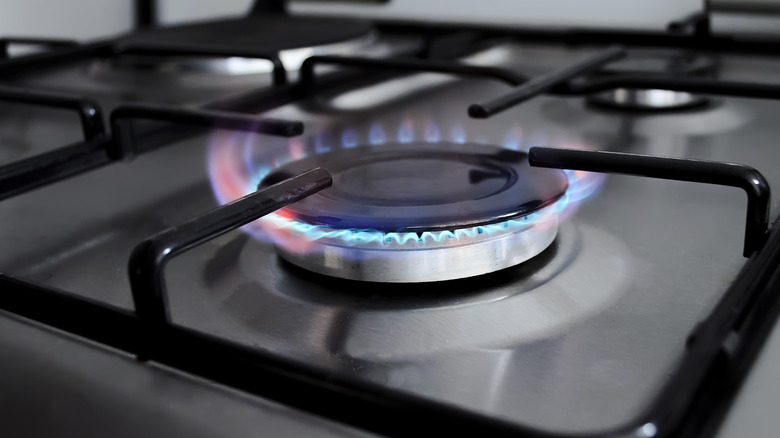Gas Vs Electric Ovens: What Are The Differences In Cost & Efficiency?
If you're weighing the differences between gas and electric ovens, cost is an obvious factor that comes to mind. Costs, of course, are not limited to the purchase price of the appliance. There is also the operational cost of the oven — a recurring expenditure you'll have to bear for the duration of the oven's useful life cycle. Energy efficiency is yet another variable. Even though efficiency variances don't always translate to a cost difference, you may want to know how oven emissions correlate with the oven's useful output. As it happens, electric ovens come out on top in some of these comparisons, while gas ovens fare better in others.
Upfront, electric and gas ovens cost about the same. You can find electric and gas ovens on the lower end of the price range around $500, with the upper end of the range sitting above the $10,000 mark. It's the electric induction ovens that tend to be substantially pricier, with price tags spanning from $800 to over $20,000. Below, you'll see how gas and electric ranges compare in operating costs and efficiency, and learn a few more facts that will help you decide between the two oven types.
Efficiency and operational costs of gas and electric ovens
According to research, gas ovens are less efficient than their electric counterparts. A study performed by the Electric Power Research Institute measured how much energy gas, electric coil, and electric induction stoves consumed relative to the energy transferred to a large pot with water. The study found that gas ovens were around 42% efficient when running on half power and 35% efficient when the heat was on full. Meanwhile, the electric coil stove showed efficiencies of around 82% and 83%, at half and full power, respectively. Electric induction ovens were marginally less efficient, scoring 76% on average during the efficiency evaluation. In simple terms, these results mean that only 40% of the heat a gas oven produces ends up heating the food you cook. On the other hand, electric ovens can heat food with almost double the efficiency of their gas peers.
Despite being less efficient, gas ovens are not necessarily more expensive to operate. While a direct comparison of operational costs is difficult to perform because gas and electricity usage is quantified in different units of measure, gas stoves are generally a bit cheaper to run than electric ones. These energy savings are part of the reason gas ovens are more popular than electric ones. Of course, the actual running costs hinge on the prices of gas and electricity in your region. Also, some of the highly efficient electric stoves may perform better than their gas equivalents even in terms of operational costs.
Other factors to consider when deciding between a gas and electric oven
Apart from energy efficiency and running expenses, there are a few more factors you should take into account when deciding between a gas and electric stove. The first one is really simple: what type of utility connections do you have in the kitchen? If your house or building has a gas connection, but none is drawn to the kitchen, installing a gas oven would entail hiring a plumber to set up the gas pipework. Likewise, an electrical stove needs a 220V connection, whereas 110V is the standard in the U.S. So, if you don't have one already (for example, if you've added a new kitchen to your home) you'll need a 220V outlet set up by an electrician before you can operate an electric stove.
How you clean an oven also differs between electric and gas varieties. Smooth-surface electric ovens take little time to clean. You just wipe the surface down and that's it. Meanwhile, cleaning a gas oven entails removing the iron grates and cleaning between the burners, which takes a bit longer. If the stains are baked on to the surface, you'll spend time and effort cleaning the stovetop whether it's gas or electric. Last but not least, research shows that gas stove use emits nitrogen dioxide into the air, which causes respiratory irritation and asthma in some children. At the same time, gas stoves often leak natural gas, which contains benzene, a carcinogenic compound. Choosing an electric oven helps eliminate these health hazards.


